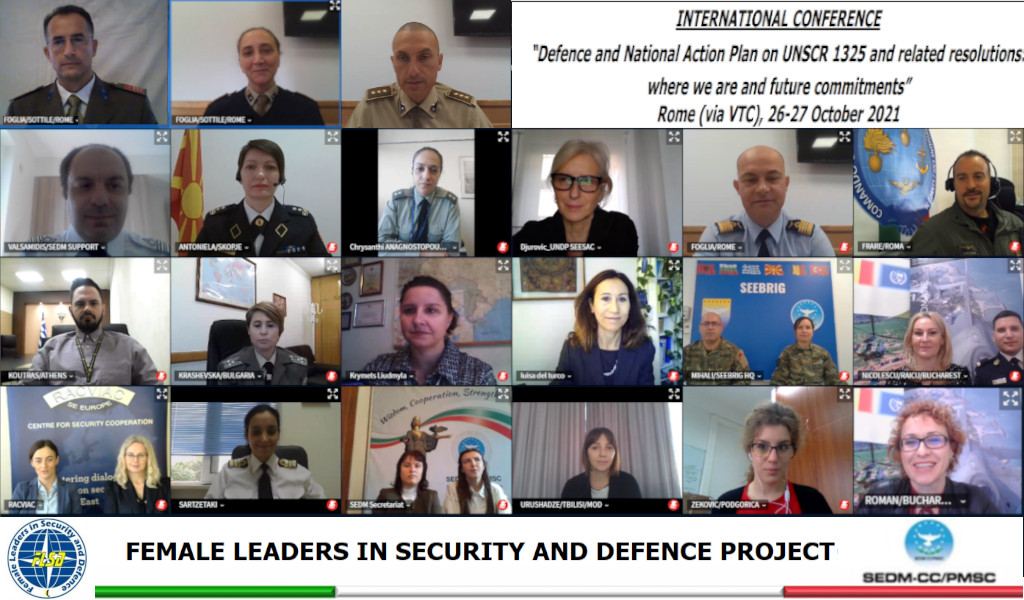 Military Experts Meeting on Gender
Military Experts Meeting on Gender
“Defence and National Action Plan on UNSCR 1325 and related resolutions:
where we are and future commitments”
26 and 27 October 2021
Rome, as host nation of Female Leaders in Security and Defence (FLSD) Project, organized the International Conference “Defence and National Action Plan on UNSCR 1325 and related resolutions: where we are and future commitments”on Tuesday and Wednesday, 26-27 October 2021.
The aims of the event were:
- To reaffirm national commitment to the FLSD project;
- The full implementation of the UNSCR 1325 and related resolutions; and
- To compare similar approaches, activities and areas of interest included in the National Action Plans, in order to explore the possibility to develop future joint activities.
The event, conducted through the SEDM videoconference system, took place under the auspices of the Process of Meetings of Defence Ministers of Southeast Europe (SEDM) and was part of the set of actions undertaken by Rome as a nation interested in organizing international conferences dedicated to the promotion of gender perspective and gender equality.
The Chief of the Training Office of the 1st Department of the Defence Staff, who opened the Conference, stated “The workshop will focus on equal opportunities and gender perspective within military organizations and operations, and, in particular, on the National Action Plan on Women, Peace and Security and CIMIC activities.”
He added “We are all aware of this: gender inequalities undermine durable peace and stability. This also occurs because post-war management and the restoration of peace and security are phases where the roles played by women does not always entail overcoming marginalization. Yet, those phases could provide a fruitful opportunity to involve more widely the female population in the negotiations and political dynamics generated by the cease-fire and the cessation of hostilities. For example, extending the right to vote to women or including female representation in formal or informal assemblies.”
The conference was attended by experts from SEDM Members:Sofia, Tbilisi, Athens, Rome, Podgorica, Skopje, Bucharest, Belgrade, Kyiv, Representatives from United Nations Development Programme South Eastern and Eastern Europe Clearinghouse for the Control of Small Arms and Light Weapons (UNDP SEESAC),Centre for Security Cooperation in South Eastern Europe (RACVIAC), South-Eastern Europe Brigade (SEEBRIG), South-East Europe Defence Ministerial (SEDM).
The workshop focused on equal opportunities and gender perspective within military organizations and operations and, in particular, on the National Action Plans on Women, Peace and Security and CIMIC activities.
During the two-day conference, participants shared the status of equal opportunity and gender perspective in their respective domains and suggested future developments on common interests.
One of the key message was that National Armed Forces need to be more and more aware of the fact that the system resting upon the cornerstone of Resolution 1325 is not an ideal to-do-list but a true manifesto for equality and a call to include gender perspective into military operations. The success of those operations is linked to the concern for female communities, which are often the victims most affected by conflicts, and to their inclusion in the reconstruction process, in which female soldiers can often provide a unique contribution.
From a military point of view, the Resolution 1325 has entailed the inclusion of gender perspective in the planning process, along with the developing a doctrine and a series of ad-hoc training activities, in addition to the creation of a specific professional figure within Staffs, namely the Gender Advisor.
Gender perspective finds application not only in the operational context but also in the organizational context.
In fact, the presence of military personnel of both genders, male and female, has required military organizations to change their approach to human resource management in regards to the internal aspect, that is to say the well-being of staff, and to the employment aspect, namely managing servicemen and servicewomen deployed in operations abroad.
In the internal management of the organization, subjects such as motherhood and, more generally, parenting and family care should be considered. More attention should be paid to how those are differently perceived according to one’s gender.
Those fields are relatively new for the military and they represent useful tools to improve our armed forces. For this reason, it is fundamental to understand them and to consider themin the activities we carry out.
During the conference, speakers from FLSD Countries presented their national experiences and shared best practices in each respective domain. It was a further step taken on a pathway that see us constantly committed in the shared project to disseminate, in the most effective manner, gender perspective and equality between men and women within the military organizations of the participating countries.
The conference was a great opportunity to confirm, at international level, the importance of gender perspective and UNSCRs on Women, Peace and Security in the prevention and resolution of conflicts, in the promotion of peace and security, as well as in the political and military decision-making process.